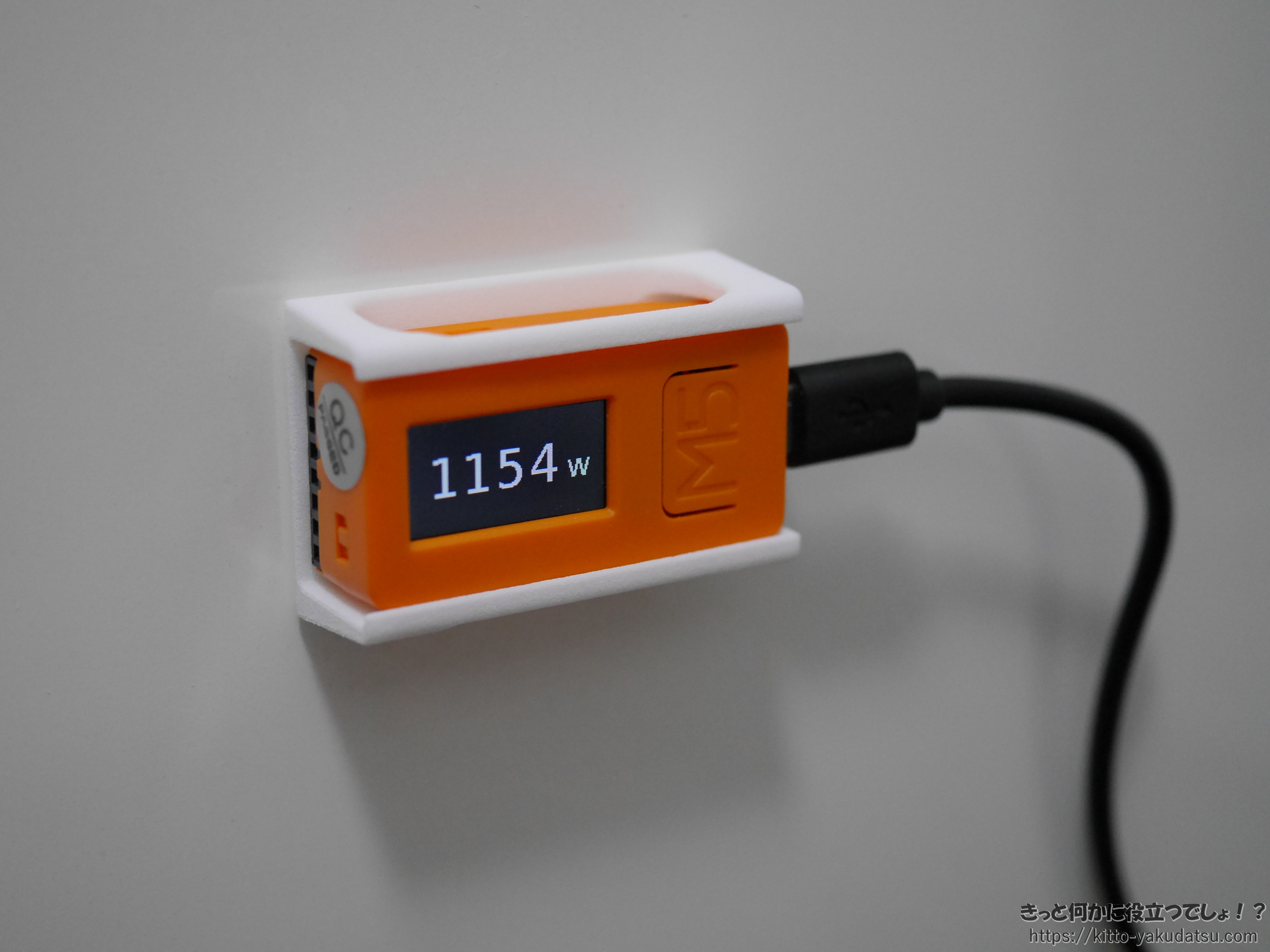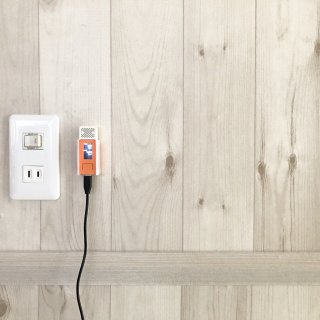MH-Z19の結果をambientに送信
先日作った、MH-Z19の測定プログラムにambientへ定期的に送信するプログラムを追加しました。内容は前回SPG30で作ったプログラムとほとんど同じです。
#include <M5StickC.h> //ネットワーク関係 #include <WiFi.h> #include <HTTPClient.h> #include <WiFiClientSecure.h> const char* WifiSSID = "SSID"; const char* WifiPassword = "PASSWORD"; //日時 RTC_TimeTypeDef RTC_TimeStruct; RTC_DateTypeDef RTC_DateStruct; const long JST = 3600*9; //Japan Standard Time GMT+9 struct tm timeInfo;//時刻を格納するオブジェクト String nowTimeString; //現在時刻のString unsigned long nowTimeUNIX; //現在時刻のUNIXTime //Ambient #include "Ambient.h" const unsigned int WriteChannelId = XXXXXX; // 送信用AmbientのチャネルID const char* writeKey = "ライトキー"; // ライトキー WiFiClient wifiClient; Ambient ambient; const int sendTimeMin = 1; //送信するタイミング[分] 1=1分毎に送信 bool ambientSendOk; //Ambientへデータが送信できた //MHZ19センサ用 unsigned long getDataTimer = 0; //時間保持用 const unsigned long getDataPeriod = 1000; //測定周期[ms] int CO2 = 400; int temperature = 20; //画面の明るさ bool lcdOn = false; void setup() { M5.begin(); M5.Lcd.fillScreen(BLACK); M5.Lcd.setRotation(0); //MH-Z19用シリアル Serial1.begin(9600, SERIAL_8N1, 0, 26); //デバッグ用シリアル Serial.begin(115200); Serial.println("MH-Z19 test"); //測定レンジ変更 setDetectionDange(5000); //アクセスポイントに接続 if( connectToAp() == false ) { //アクセスポイントに接続できなかったらリスタート Serial.println("Can't connect. Restert."); ESP.restart(); } //RTCをNTPサーバの時間せ設定する setRTC(); getRTCTime(); //Ambient初期化 ambient.begin(WriteChannelId, writeKey, &wifiClient); // チャネルIDとライトキーを指定してAmbientの初期化 M5.Lcd.fillScreen(BLACK); } void loop() { M5.update(); //Aボタンを押すと、画面の明るさをON,OFFする if( M5.BtnA.pressedFor(1) ){ if( lcdOn == true ) { lcdOn = false; M5.Axp.ScreenBreath( 0 ); } else { lcdOn = true; M5.Axp.ScreenBreath( 15 ); } } //Bボタンを押すと、キャリブレーション if( M5.BtnB.pressedFor(1000) ){ setZeropoint(); Serial.println(" calibrated"); delay( 4000 ); } //測定 if( getGasConcentration( &CO2 , &temperature ) ) { Serial.println("CO2[ppm]: " + String(CO2) + "\tTemperature['C]: " + String(temperature)); } //測定結果の表示 int yLocation = 0; M5.Lcd.setCursor(0, yLocation, 2); M5.Lcd.println("CO2"); yLocation+=16; String str = " " + (String)CO2; M5.Lcd.drawRightString(str, M5.Lcd.width(), yLocation,4); yLocation+=24; M5.Lcd.drawRightString("[ppm] ", M5.Lcd.width(), yLocation,2); yLocation+=16; yLocation+=8; M5.Lcd.setCursor(0, yLocation , 2); M5.Lcd.println("Temperature"); yLocation+=16; str = " " + (String)(temperature); M5.Lcd.drawRightString(str, M5.Lcd.width(), yLocation,4); yLocation+=24; M5.Lcd.drawRightString("['C] ", M5.Lcd.width(), yLocation,2); yLocation+=16; //指定時間ごとに実行 M5.Rtc.GetTime(&RTC_TimeStruct); if( ( RTC_TimeStruct.Minutes % sendTimeMin ) == 0 && (RTC_TimeStruct.Seconds == 5 ) ) { //Ambientへデータを送信 ambient.set(3, CO2); ambientSendOk = ambient.send(); if( ambientSendOk == false ) Serial.println("ambient send failed."); } delay(1000); } /*--- ネットワーク時刻用 ---*/ //アクセスポイントに接続 bool connectToAp() { Serial.print("Try to connect to AP:"); Serial.println(WifiSSID); //10回接続を試みる for( int i=0 ; i<10 ; i++ ) { M5.Lcd.printf("Connect\n" ); M5.Lcd.printf(" %s\n",WifiSSID); Serial.print("Try"); Serial.print(i+1); WiFi.mode(WIFI_STA); WiFi.disconnect(); WiFi.begin(WifiSSID, WifiPassword); // Wi-Fi APに接続 for( int j=0 ; j<300 ; j++ ) { if( j%10 == 0) { M5.Lcd.print("*"); Serial.print("*"); } delay(100); if(WiFi.status() == WL_CONNECTED) break; } if(WiFi.status() == WL_CONNECTED) break; delay(5000); //5秒待ってから再接続 } Serial.print("WiFi connected\r\nIP address: "); Serial.println(WiFi.localIP()); return (WiFi.status() == WL_CONNECTED); } //UNIXTimeをRTCにセットする void setRTC() { configTime(JST, 0, "ntp.nict.jp", "time.google.com", "ntp.jst.mfeed.ad.jp");//NTPの設定 getLocalTime(&timeInfo);//tmオブジェクトのtimeInfoに現在時刻を入れ込む char s[30];//文字格納用 sprintf(s, " %04d/%02d/%02d %02d:%02d:%02d %01%", timeInfo.tm_year + 1900, timeInfo.tm_mon + 1, timeInfo.tm_mday, timeInfo.tm_hour, timeInfo.tm_min, timeInfo.tm_sec, timeInfo.tm_wday);//人間が読める形式に変換 Serial.println(s);//時間をシリアルモニタへ出力 Serial.println(mktime( &timeInfo )); //RTCに日時をセット RTC_TimeStruct.Hours = timeInfo.tm_hour; RTC_TimeStruct.Minutes = timeInfo.tm_min; RTC_TimeStruct.Seconds = timeInfo.tm_sec; M5.Rtc.SetTime(&RTC_TimeStruct); RTC_DateStruct.WeekDay = timeInfo.tm_wday; RTC_DateStruct.Month = timeInfo.tm_mon + 1; RTC_DateStruct.Date = timeInfo.tm_mday; RTC_DateStruct.Year = timeInfo.tm_year + 1900; M5.Rtc.SetData(&RTC_DateStruct); return; } //現在時刻のStringとUNIXTimeを設定する void getRTCTime() { M5.Rtc.GetTime(&RTC_TimeStruct); M5.Rtc.GetData(&RTC_DateStruct); //Stringを生成 char s[30]=""; sprintf(s, "%04d/%02d/%02d-%02d:%02d:%02d", RTC_DateStruct.Year, RTC_DateStruct.Month, RTC_DateStruct.Date, RTC_TimeStruct.Hours, RTC_TimeStruct.Minutes, RTC_TimeStruct.Seconds); nowTimeString = s; //UNIXTimeを生成 struct tm tmp; tmp.tm_year = RTC_DateStruct.Year -1900; tmp.tm_mon= RTC_DateStruct.Month -1; tmp.tm_mday = RTC_DateStruct.Date; tmp.tm_hour = RTC_TimeStruct.Hours; tmp.tm_min = RTC_TimeStruct.Minutes; tmp.tm_sec = RTC_TimeStruct.Seconds; nowTimeUNIX = mktime( &tmp ); //Serial.println(nowTimeUNIX); return; } /*--- MH-Z19用 ---*/ #define MHZ19_DATA_LEN 9 //CO2,温度を取得する bool getGasConcentration(int *CO2 , int *temperature ) { byte command[MHZ19_DATA_LEN] = {0xff,0x01,0x86,0x00,0x00,0x00,0x00,0x00,0x79}; sendCommand( command , sizeof(command) ); byte response[MHZ19_DATA_LEN]; recieveResponse( response ); //コマンドチェック if( response[1] != 0x86 ) { Serial.printf("Response Error '%x'\n",response[1]); return false; //timeOut } int CO2Temp = (int)response[2] * 256 + (int)response[3]; int temperatureTemp = (int)response[4] -40; *CO2 = CO2Temp; *temperature = temperatureTemp; return true; } //ゼロポイントキャリブレーション bool setZeropoint() { byte command[9] = {0xff,0x01,0x87,0x00,0x00,0x00,0x00,0x00,0x78}; sendCommand( command , sizeof(command) ); byte response[MHZ19_DATA_LEN]; recieveResponse( response ); //コマンドチェック if( response[1] != 0x87 ) { Serial.printf("Response Error '%x'\n",response[1]); Serial.printf("reaponse %x %x %x %x %x %x %x %x %x\n", response[0], response[1], response[2], response[3], response[4], response[5], response[6], response[7], response[8]); return false; //timeOut } return true; } //測定レンジ変更 bool setDetectionDange(int range) { if( range != 2000 && range != 5000 ) { Serial.printf("invalid range. Please set 2000 or 5000 \n"); return false; } byte command[9] = {0xff,0x01,0x99,0x00,0x00,0x00,0x00,0x00,0x00}; command[3] = (byte)(range/256); command[4] = (byte)(range%256); command[8] = calcCheckSum(command); sendCommand( command , sizeof(command) ); byte response[MHZ19_DATA_LEN]; recieveResponse( response ); //コマンドチェック if( response[1] != 0x99 ) { Serial.printf("Response Error '%x'\n",response[1]); Serial.printf("reaponse %x %x %x %x %x %x %x %x %x\n", response[0], response[1], response[2], response[3], response[4], response[5], response[6], response[7], response[8]); return false; //timeOut } return true; } //コマンドの送信 void sendCommand(byte command[], int length) { //Serial.printf("command %x %x %x %x %x %x %x %x %x\n", command[0], command[1], command[2], command[3], command[4], command[5], command[6], command[7], command[8]); for( int i=0 ; i<length ; i++ ) Serial1.write(command[i]); } //チェックサムの計算 byte calcCheckSum( byte data[] ) { byte checkSum = 0; for (int x = 1; x<MHZ19_DATA_LEN-1; x++) { checkSum += data[x]; } checkSum = 255 - checkSum; checkSum++; return checkSum; } //センサから応答を受信する bool recieveResponse( byte response[] ) { unsigned long timeStamp = millis(); //返答の先頭の0xFFが来るのを待つ while(1){ if( Serial1.available() ) { byte res; Serial1.readBytes(&res, 1); if( res == 0xff ) break; } if (millis() - timeStamp >= 2000) { Serial.println("0xFF wait Time Out"); return false; //timeOut } //millisがオーバーフローしたらgetDataTimerをリセット if( timeStamp > millis() ) timeStamp = millis(); } //8バイトたまるのを待つ timeStamp = millis(); while (Serial1.available() < MHZ19_DATA_LEN-1) { if (millis() - timeStamp >= 2000) { Serial.println("Recieve Time Out"); return false; //timeOut } //millisがオーバーフローしたらgetDataTimerをリセット if( timeStamp > millis() ) timeStamp = millis(); } //データの読み出し response[0] = 0xff; Serial1.readBytes(&(response[1]), MHZ19_DATA_LEN-1); //Serial.printf("reaponse %x %x %x %x %x %x %x %x %x\n", response[0], response[1], response[2], response[3], response[4], response[5], response[6], response[7], response[8]); //チェックサムチェック if( response[8] != calcCheckSum( response ) ) { Serial.printf("Check Sum Error read'%x' correct'%x'\n", response[8], calcCheckSum(response ) ); Serial.printf("reaponse %x %x %x %x %x %x %x %x %x\n", response[0], response[1], response[2], response[3], response[4], response[5], response[6], response[7], response[8]); return false; } return true; }
このプログラムの2箇所をご自宅の環境に合わせて変更します。
const char* WifiSSID = "SSID"; const char* WifiPassword = "PASSWORD";
SSIDとPASSOWRDをご自宅の無線LANの設定に変更します。
//Ambient #include "Ambient.h" const unsigned int WriteChannelId = XXXXX; // 送信用AmbientのチャネルID const char* writeKey = "ライトキー"; // ライトキー
チャネルIDとライトキーをご自身のAmbientの設定に合わせて変更します。
以上で、1分毎にCO2の測定結果をAmbientに送信してくれます。
壁に設置
以前紹介したM5StickC用のホルダーを壁に画鋲で固定します。
これを3Dプリンタで印刷します。印刷時のパラメータなどはこちらの記事の中程をご覧ください。
これで、SPG30センサの隣に、MH-Z19センサが設置できました。これでしばらく測定し、Ambientにデータが蓄積されるのを待ちます。
測定結果
ある日の深夜から午後までのCO2の測定結果です。左がSGP30、右がMH-Z19のセンサです。同じ場所、同じ時間に測定しているのですが、大きく波形が異なります。
この後も、SGP30のセンサは値が6000とか10000とか異常に大きな値を計測しています。何かおかしいので、後で調べてみます。










コメント